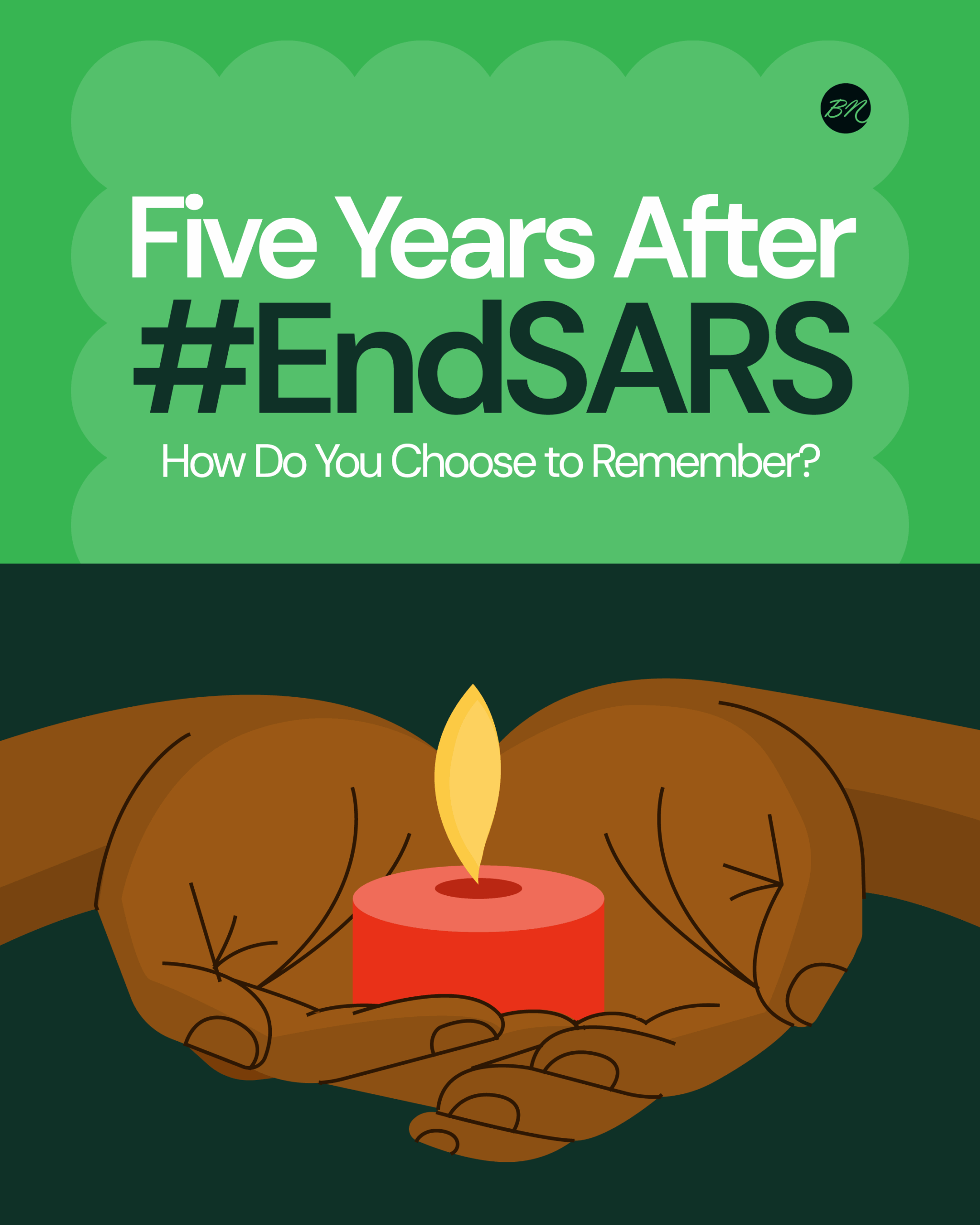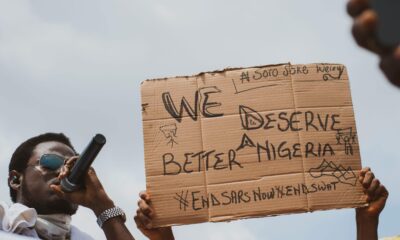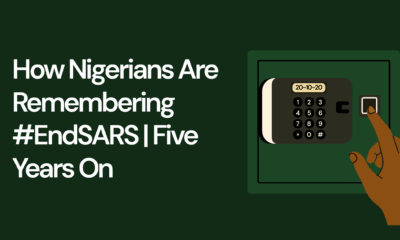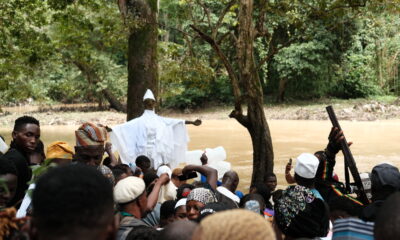Features
Five Years After #EndSARS: How Do You Choose to Remember?

It’s been exactly five years since the hopes of many Nigerians were dashed when the Nigerian army shot at peaceful protesters at the Lekki Toll Gate in Lagos. The 20th of October, 2020. What began as a nationwide peaceful protest–young Nigerians marching to demand a rescue from the hands of bad governance that continues to deny them an enabling society to grow, compete with international standards and live in a country that promises safety–tragically and ironically ended by the very thing they were protesting against. The peaceful protests were the only way Nigerians could express their grievances, demand better from the government and change the country for the better. But, as the events finally unfolded, they were simply shown they had no right to protest.
It’s been five years, and many have continued living with, one, the pride that a young generation of Nigerians began the #EndSARS movement and lodged it in the books of history, and two, the disappointment that after the massacre in Lekki Toll Gate, there were no other tool to demand the best from the government without the risk of losing their lives.
At the massacre, parents lost their children, children lost their parents, friends lost friends, and many still nurture the bruises from the stampede of running for their dear lives. Books have been written. Movies have been produced. Songs have been released. But how does one remember an event of this kind? What does one choose to remember from a massacre after rendering one’s sweat and voice to the cause?
We speak to Temitayo Akinyemi, Victor Daniel and Pelumi Salako to tell us what they have chosen to remember from the #EndSARS protest and what has stayed with them since 2020.
Where were you on the day of the Lekki Toll Gate shooting, and what’s one photo or story from that time you still remember clearly?
Victor Daniel: I was in Abuja. There was a football match that night. As I got ready for the game, I saw that famous “last stand” photo: a crowd sitting quietly in front of the toll gate. The image screamed “moments before disaster.” It was powerful, but there was something deeply eerie about their quiet resolve. I left my phone at home and went to watch the match. When I came back and turned it on, it felt like the world had crashed and burned while I was briefly away. If I’d been in Lagos at the time, I know I would have been there. For days afterwards, I battled a terrible anxiety. I just couldn’t believe the extent to which the government was willing to go to crush a peaceful protest.
Temitayo Akinyemi: I was in Port Harcourt, trying to catch all the updates of the Lekki protest on Twitter (now X), before someone said a DJ Switch was live on Instagram. I joined her stream for a short while, but due to internet buffering, I went back to Twitter for more information. That night, we became an unwilling audience in the broadcast murder of young Nigerians begging the government to tell its police to stop killing us. So the government sent its soldiers instead.
Pelumi Salako: I was with my family in Ogbomoso, and it was there that I joined the protest a few times against my mother’s counsel. That picture of protestors huddled together at Lekki tollgate, waving the national flag, still haunts me today. These were unarmed young people pumped with revolutionary energy, fighting for the future of their country at a protest site. And you just start raining bullets on them?
What has stayed with you from 2020, something you can’t unsee or unfeel?
Victor Daniel: That feverish sense that we were about to make history. It felt like we were standing on the edge of real, organic change. Maybe I was naïve back then. Maybe I overestimated the moral compass of our leaders. But it awakened something in me that has never quite died out.
Temitayo Akinyemi: I can’t think of #EndSARS without immediately hearing the voices from Lekki Tollgate on the night of October 20, 2020, telling other protesters to lie down and keep waving the flag. “They cannot shoot at us,” one of the voices said. But they did shoot them, and it is not a memory that leaves you.
Pelumi Salako: I think it is that those in power and their lackeys tried to deny the Lekki shooting in the face of overwhelming evidence. It tells me how devoid of conscience those steering the affairs of our country have become. It is obscene, it is scary.
How did #EndSARS change the way you see protest, or Nigeria?
Victor Daniel: I saw how quickly and effectively an organic uprising could form. Yes, it was a protest, but I’m still amazed by how organised it was. Unfortunately, the government saw it too. Since then, they’ve become smarter, more cynical, and more deliberate about how to divide people and prevent us from ever finding that same political will again.
Temitayo Akinyemi: To an extent, I understood, historically, that protests in Nigeria were a show of force from the government. Regardless of what the subject of the protest is, the government uses words like quash, end, clear, to describe dissolving protests, and they mean those words. When they started calling #EndSARS protesters hoodlums, I knew what was coming. Yet, what came was still soul-crushing. It painted a picture, in blood, of a country with a violent past that has refused to let go of its violent ways.
Pelumi Salako: It has become abundantly clear that we have a very short collective memory, and our ability to hold a grudge is next to zero. Also, it is just a game to some people, a chance to get recognition and get a seat at the table. Very little code, honour and respect for the dead.
How do you choose to remember #EndSARS?
Victor Daniel: I choose to remember #EndSARS through the stories of thousands of young Nigerians like me who still experience pockets of state-sponsored violence. I try to convince myself that #EndSARS achieved something monumental. It’s hard to believe that now, but I remain stubbornly adamant, because I can’t bear the thought that all the effort we poured into the protests meant nothing in the end.
Temitayo Akinyemi: I choose to remember the courage of those who protested. Resistance is hard, especially when it seems futile. Yet, we resisted, collectively. And I choose to always remember that resistance written in our blood and sweat.
Pelumi Salako: I choose to remember and respect the sacrifices of those who were hurt and died in the course of advocating for a better future for us, so we can have a respectable homeland to leave for our own children. This country must work so their sacrifices will not go in vain.
October 20, 2020, will always be the night the nation looked at its youth and pulled the trigger. What have you chosen to remember from #EndSARS?
























